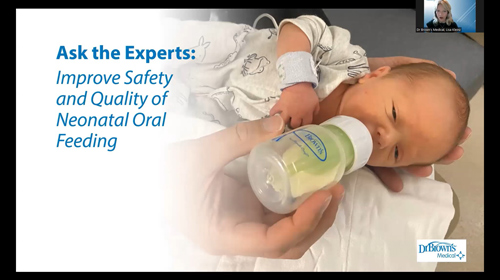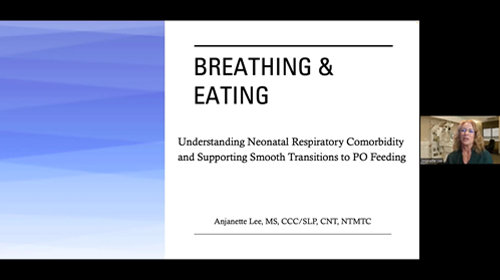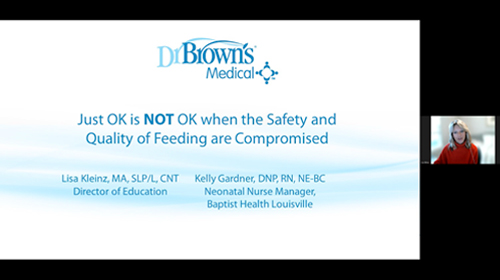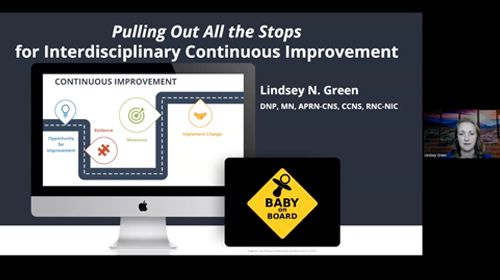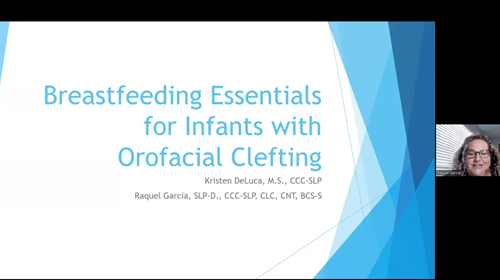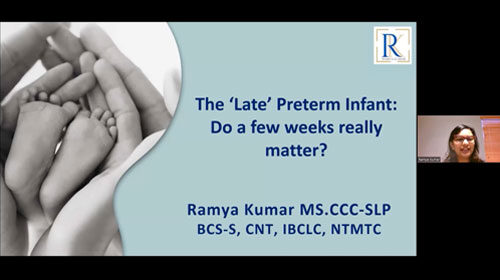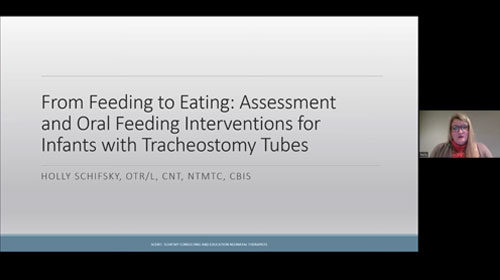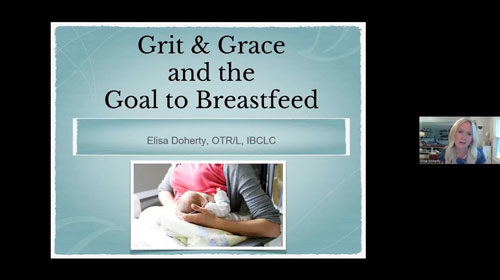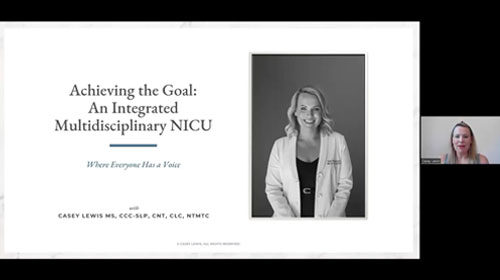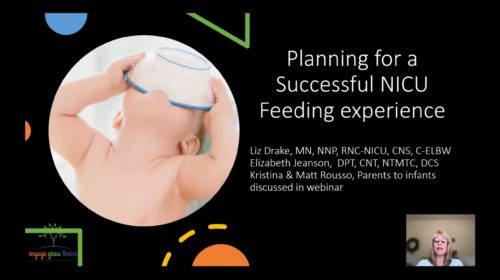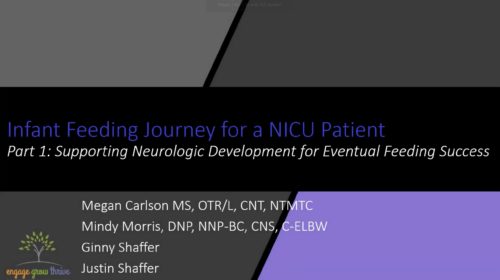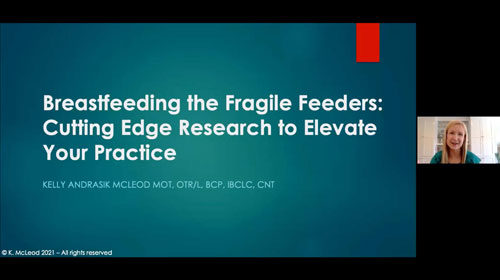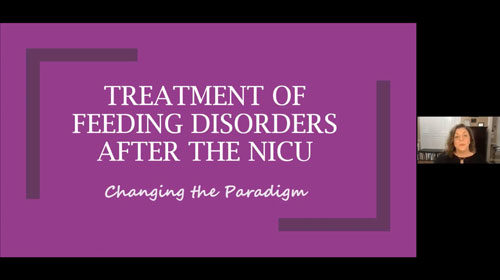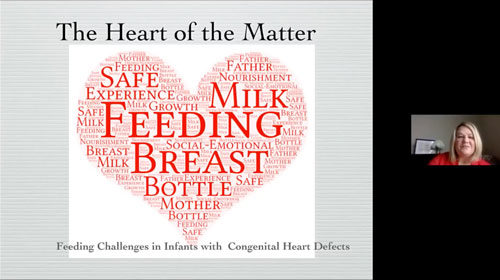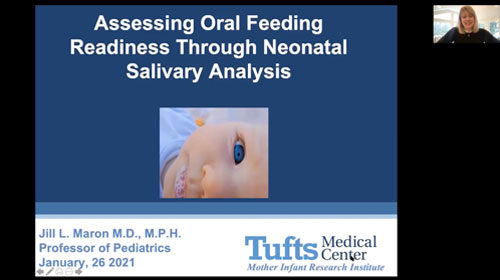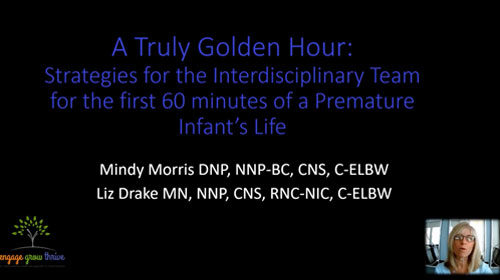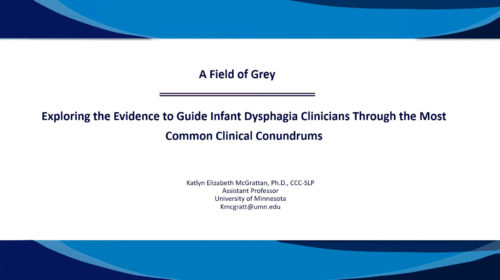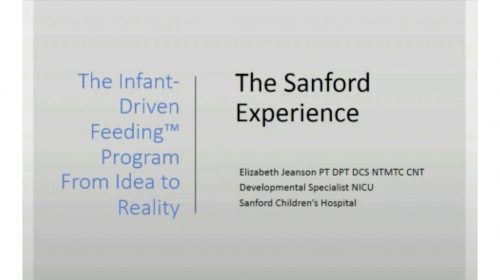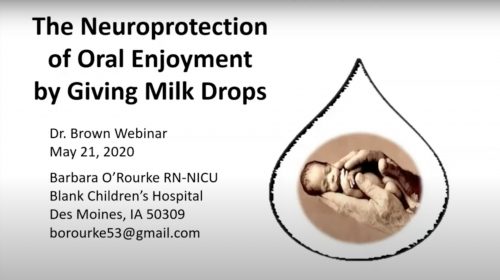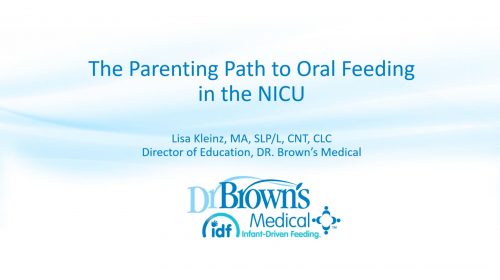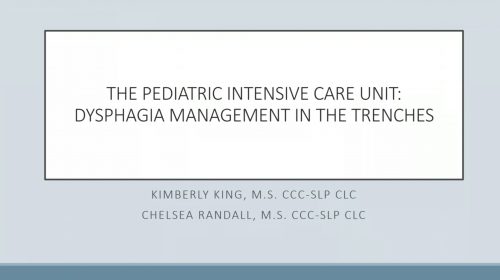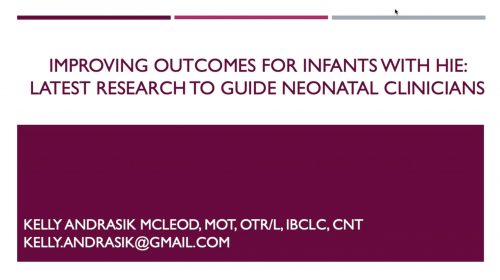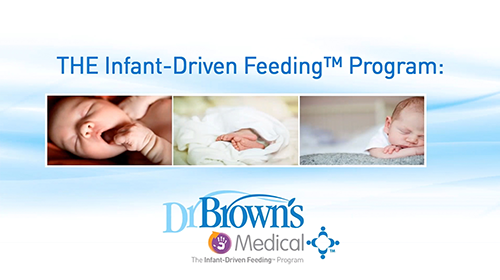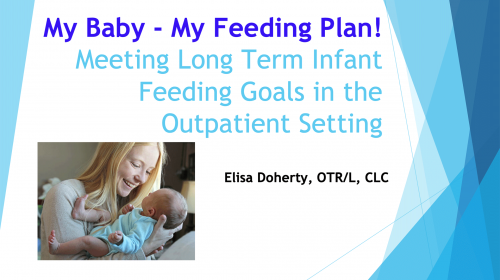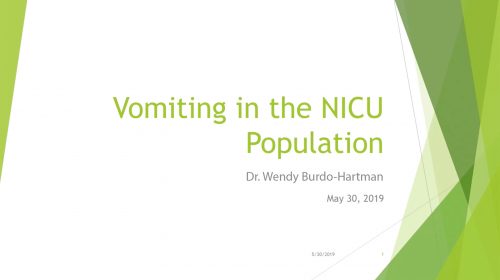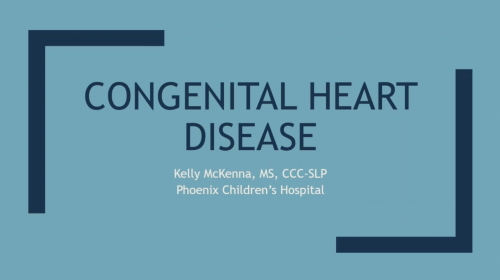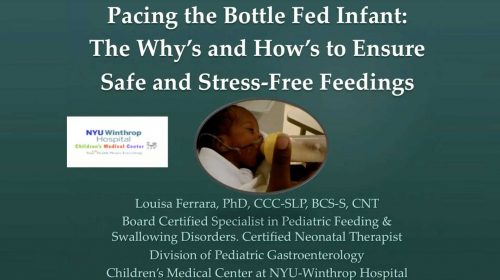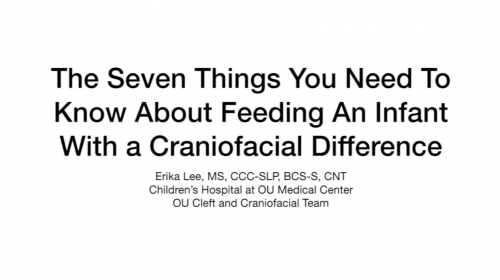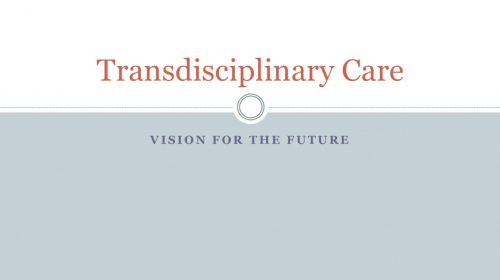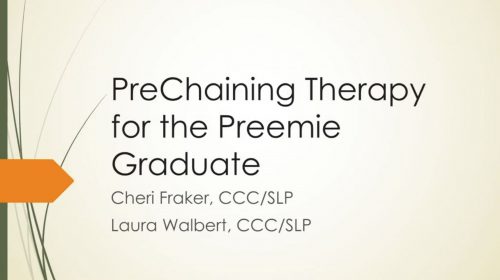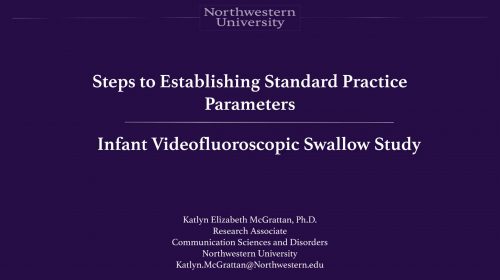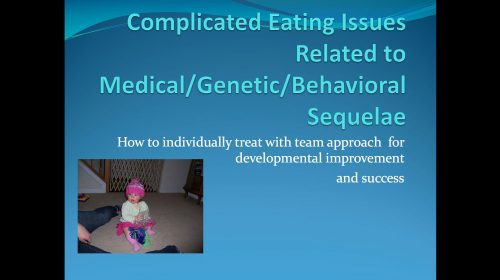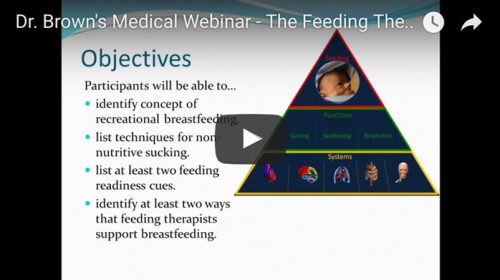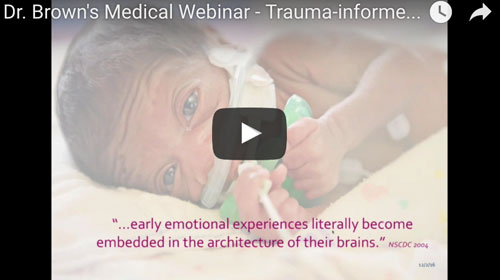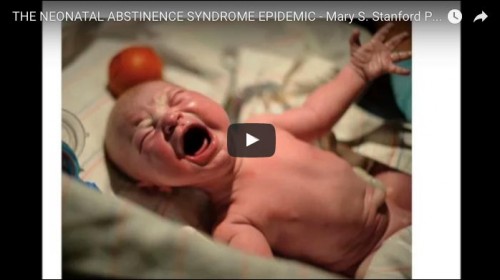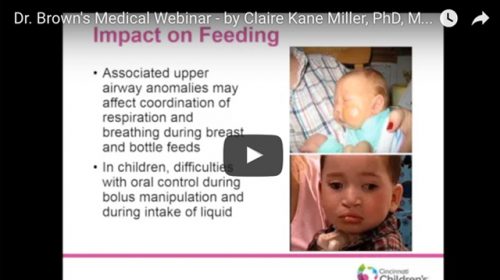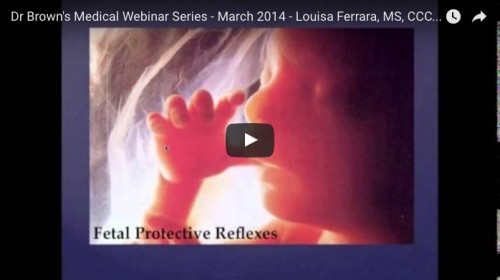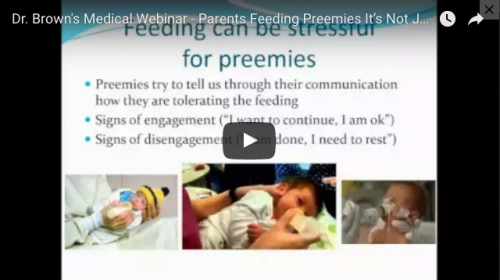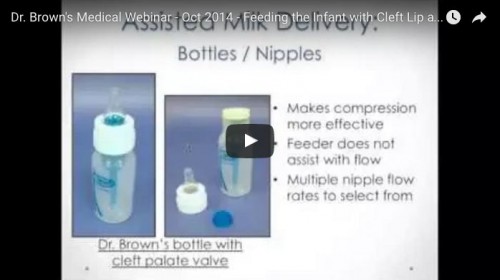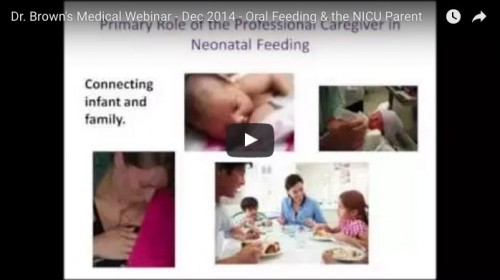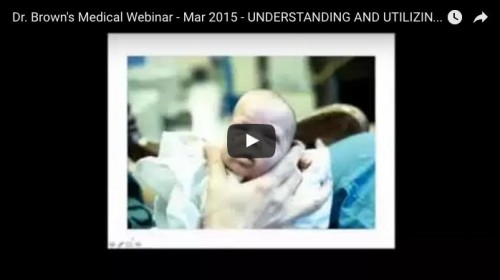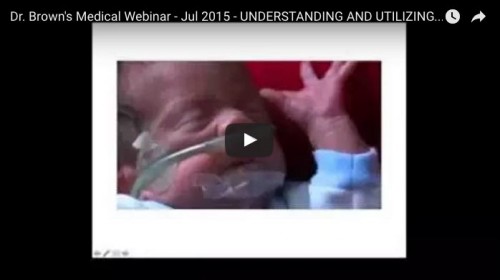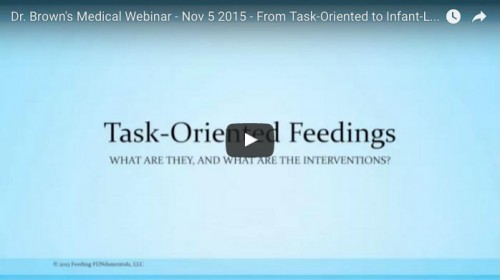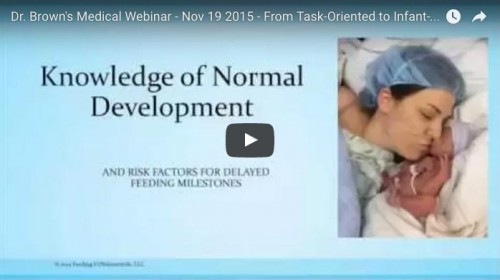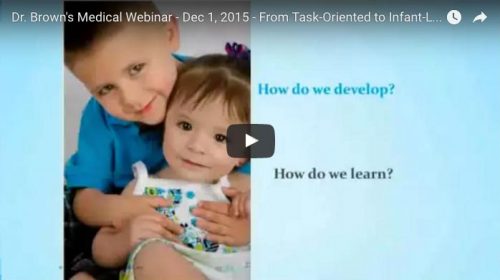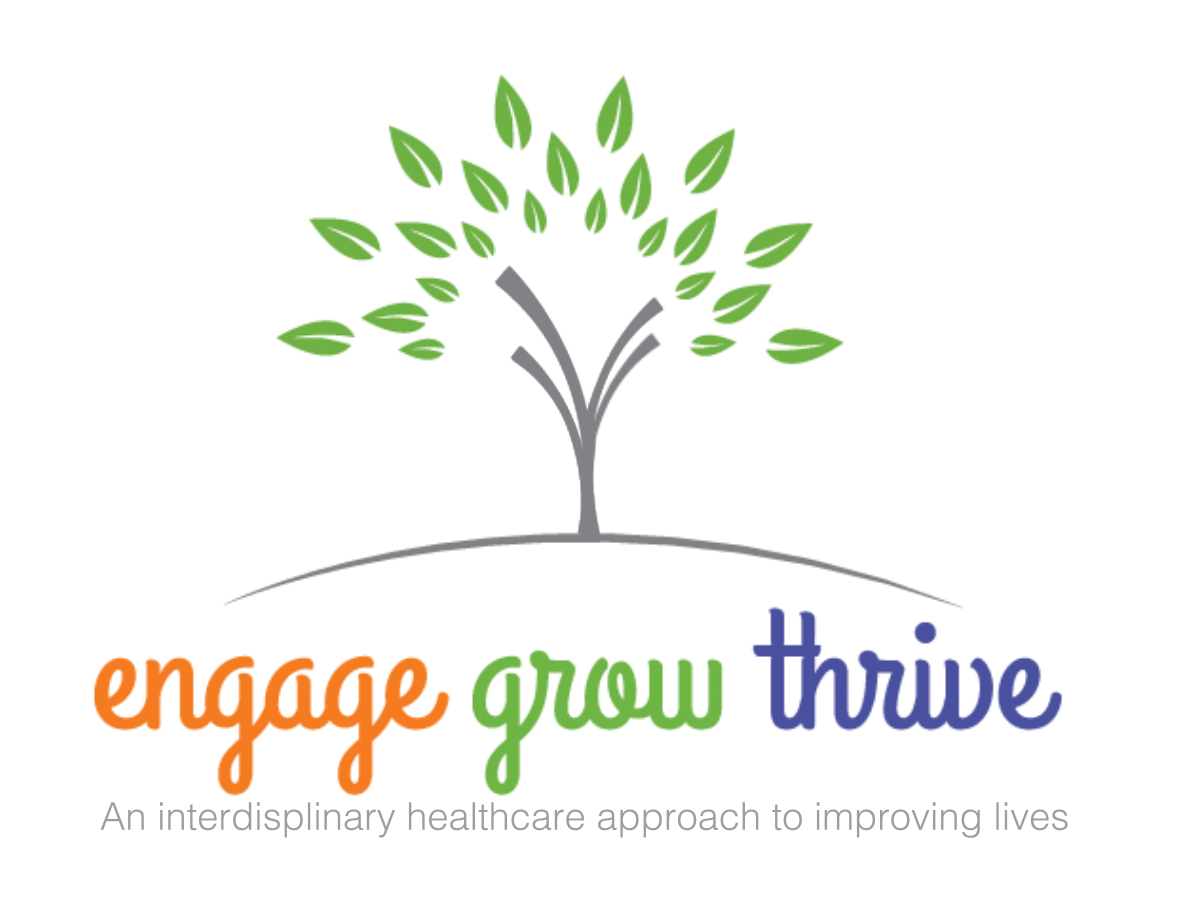Featured Webinar:
Ask the Experts: Improve Safety and Quality of Neonatal Oral Feeding
Presented by: April Blandford-Cushing, PT, DPT, CCS; Brianna Bommarito, MSOT, OTR/L; Kelly Gardner, DNP, RN, NE-BC; Jennifer Hofherr, MS, OTR/L, CNT, NTMTC; Casey Lewis, MS, CCC-SLP, CNT, NTMTC
Date: June 25th, 2024
CEs Provided: N/A
All other disciplines receive a "Certificate of Participation."
During this one-hour presentation, experts in the field of neonatal feeding discussed how their units improved the safety and quality of oral feeding with the use of Dr. Brown’s Products. Topics included transitioning to the Dr. Brown’s® Zero-Resistance® Bottle System with quality-controlled nipple flow rates, therefore eliminating “nipple wars, ” and successful implementation of the Infant-Driven Feeding® Program to transform the feeding culture in their units. The parent perspective was included as well. The presentation included an extensive question-and-answer panel responding to viewer’s questions.
Previous Webinars:
Ask the Experts: Improve Safety and Quality of Neonatal Oral Feeding
PRESENTED BY: April Blandford-Cushing, PT, DPT, CCS; Brianna Bommarito, MSOT, OTR/L; Kelly Gardner, DNP, RN, NE-BC; Jennifer Hofherr, MS, OTR/L, CNT, NTMTC; Casey Lewis, MS, CCC-SLP, CNT, NTMTC
Date: June 25th, 2024
CEs Provided: N/A
All other disciplines receive a "Certificate of Participation."
During this one-hour presentation, experts in the field of neonatal feeding discussed how their units improved the safety and quality of oral feeding with the use of Dr. Brown’s Products. Topics included transitioning to the Dr. Brown’s® Zero-Resistance® Bottle System with quality-controlled nipple flow rates, therefore eliminating “nipple wars, ” and successful implementation of the Infant-Driven Feeding® Program to transform the feeding culture in their units. The parent perspective was included as well. The presentation included an extensive question-and-answer panel responding to viewer’s questions.
Breathing & Eating – Understanding Neonatal Respiratory Comorbidity and Supporting Smooth Transitions to Oral Feeding
PRESENTED BY: Anjanette Lee, MS, CCC/SLP, NTMTC
Date: February 29th, 2024
CEs Provided: Nursing/OT
All other disciplines receive a "Certificate of Participation."
This one-hour webinar discussed neonatal respiratory comorbidity, how it might impact oral feeding, and how the neonatal practitioner can support a smooth transition to oral feeding for infants at risk. The webinar reviewed the anatomy and physiology of the respiratory system as it pertains to preterm comorbidity and the transition to oral feeding. The presentation provided strategies for neonatal practitioners to use from day of life 1 to support functional feeding outcomes.
Just Ok is NOT Ok when the Safety and Quality of Oral Feedings are Compromised
PRESENTED BY: Lisa Kleinz, M.A., SLP/L, Director of Education, Dr. Brown’s Medical; Kelly Gardner, DNP, RN, NE-BC, Nurse Manager, Neonatal ICU, Baptist Health Louisville
Date: December 12th, 2023
CEs Provided: N/A
All other disciplines receive a "Certificate of Participation."
This intermediate webinar described the current state of the science of neonatal oral feeding related to supporting safety and quality. Attendees learned information and strategies for improving current feeding practices, including a supportive feeding culture, evidence-based products and practices, and sustainability. This webinar also included one hospital’s story of how changing feeding practices led to improvement in safety and quality of oral feeding and how your hospital can make the transition as well. Target audience: OT, SLP, PT, RN, MD, and other neonatal professionals.
Pulling Out All the Stops for Interdisciplinary Continuous Improvement
PRESENTED BY: Lindsey Green, DNP, MN, APRN-CNS, CCNS, RNC-NIC
Date: September 21st, 2023
CEs Provided: Nursing/OT
All other disciplines receive a "Certificate of Participation."
Implementation of evidence-based practice requires effective leadership and enthusiastic buy-in from those responsible for making change happen. This presentation covered topics and strategies for continuous improvement. The presenter described how agile methodology, implementation science, relational coordination, change leadership and translational research can all work together to make implementation of evidence-based practice successful for patients and interdisciplinary teams.
Breastfeeding Essentials for Infants with Orofacial Clefting
PRESENTED BY: Raquel Garcia, SLP-D, CCC-SLP, CLC, CNT, BCS-S; Kristen Deluca, MS, CCC-SLP
Date: July 27th, 2023
CEs Provided: Nursing/OT
All other disciplines receive a "Certificate of Participation."
This intermediate webinar provided attendees with an overview on orofacial clefts and the importance of prenatal counseling for families to optimized postnatal feeding success for these infants. The role of breastfeeding was discussed. Strategies to support mother and baby for optimal feeding and growth in the presence of cleft palate with or without cleft lip were reviewed, with video and case examples.
The ‘Late’ Preterm Infant: Do a Few Weeks Really Matter?
PRESENTED BY: Ramya Kumar, M.S., CCC-SLP/L, BCS-S, CNT, IBCLC, NTMTC
Date: April 6th, 2023
CEs Provided: Nursing/OT
All other disciplines receive a "Certificate of Participation."
This intermediate webinar discussed the etiology and prevalence of late preterm deliveries, and morbidities that impact this population. Information was provided for collaboration between the neonatal therapy team and staff in post-partum units in an effort to provide preventative and proactive family-centered care.
The Infant-Driven Feeding™ Program: The Evidence That Will Change your Feeding Practice
PRESENTED BY: Renee Bloom, MSN, RN, RNC-NIC, RNC-LRN; Shelly Frisco, DNP, ACCNS-N, CCRN, C-ELBW ; Amanda Geringer, BSN-RN; Lisa Kleinz, MA, SLP/L, CNT
Date: December 14th, 2022
CEs Provided: N/A
Traditional feeding practices for infants are inconsistent and can result in poor feeding outcomes. The Infant-Driven Feeding™ Program is an online learning program for unit-wide education to support the transition from a volume driven culture to Infant-Driven. Join us in this webinar to learn from Nurse Clinicians who have implemented IDF™ in their hospitals and have completed QI/Research projects to show the many benefits of IDF™. This webinar will not only provide the learner with the positive outcomes of IDF™ but will also demonstrate the evidence to share with teams to support the process of acquiring IDF™. The presentation will be followed by a Question and Answer period. Whether you are trying to acquire IDF™ for your unit, or already have IDF™ and want to learn more about measuring changes, this is a webinar not to be missed.
From Feeding to Eating: Assessment and Oral Feeding Interventions for Infants with Tracheostomy Tubes
PRESENTED BY: Holly Schifsky, OTR/L, CNT, NTMTC, CBIS
Date: November 29th, 2022
CEs Provided: Nursing/OT
All other disciplines receive a "Certificate of Participation."
This advanced webinar provided clinicians with information regarding the medical rationale for infants that are candidates for tracheostomy tube placement, implications of tracheostomy tubes on the development of infant oral feeding, and interventions to support safe oral feeding for these medically complex infants. This lecture utilized evidence-based practice to provide clinicians with assessment, treatment, and goal writing strategies for this growing population. Discussion of pre-feeding oral motor, secretion management, ventilator settings and tracheostomy cuff considerations was provided, as well as advancing infants to oral feeding with consideration for selection of bottle, nipple, flow rate, positioning, and monitoring swallow coordination.
Grit and Grace and the Goal to Breastfeed
PRESENTED BY: Elisa Doherty, OTR/L, IBCLC
Date: October 28th, 2022
CEs Provided: Nursing/OT
All other disciplines receive a "Certificate of Participation."
This one-hour webinar focused on infant feeding development in relation to both bottle and breastfeeding, as well as the attributes of the mother’s role in her medical history, maternal anatomy, milk supply, and how that impacts the breastfeeding journey. The learner was provided with information for evaluation and intervention to provide the infant AND the mother, as a dyad, with developmentally appropriate goals, modifiers for improved bottle to breast transitioning, and latch strategies for improved milk transfer and reduced stress in an individualized feeding approach.
Achieving the Goal: An Integrated Multidisciplinary NICU
PRESENTED BY: Casey Lewis, MS, CCC-SLP, CNT, CLC, NTMTC
Date: May 24th, 2022
CEs Provided: Nursing/OT
All other disciplines receive a "Certificate of Participation."
This one-hour webinar discussed the roles and responsibilities of disciplines in the Neonatal Intensive Care Unit (NICU) and ways in which to foster improved multidisciplinary collaboration. The process of nipple selection to facilitate safe and enjoyable oral feeding experiences was addressed. In addition, the importance of continuity of care both within and outside the NICU was explained.
Infant Feeding Journey for a NICU Patient: Part 2 – Steps to Feeding Success and Parent Education
PRESENTED BY: Liz Drake, MN, NNP, RBC-NIC, CNS, C-ELBW; Elizabeth Jeanson, DPT, CNT, NTMTC, DCA; Kristina Russo, Mom to Olivia and Chloe, AU.D. Doctor of Audiology; Matt Russo, Dad to Olivia and Chloe
Date: February 23rd, 2022
CEs Provided: Nursing/OT
All other disciplines receive a "Certificate of Participation."
Part 2 in this series focused on practical examples to support infants and families in feeding success. Speakers included Nursing, therapy, and parents, with discussion on the roles each team member plays in parent understanding and needs, infant performance, and progress towards coordination of feeding.
Infant Feeding Journey for a NICU Patient: Part 1 – Supporting Neurologic Development for Eventual Feeding Success
PRESENTED BY: Mindy Morris, DNP, NNP-BC, CNS, C-ELBW; Megan Carlson, MS, OTR-L, CNT, NTMTC; Ginny & Justin Shaffer, Graduate NICU Parents
Date: December 9th, 2021
CEs Provided: Nursing/OT
All other disciplines receive a "Certificate of Participation."
The journey to successful oral feedings for the preterm and sick infants and their families in the NICU can be arduous. There are many strategies the entire NICU interprofessional team can integrate into practice throughout the journey to increase feeding success. In this two-part webinar series presented by neonatal professionals and parents, activities and interventions were discussed that can prepare the infant and parents in helping to build the foundational skills for positive, successful, and enjoyable oral feeding.
Breastfeeding the Fragile Feeders: Cutting Edge Research to Elevate Your Practice
PRESENTED BY: Kelly Andrasik McLeod MOT, OTR/L, BCP, IBCLC, CNT
Date: September 9th, 2021
CEs Provided: Nursing
All other disciplines receive a "Certificate of Participation."
This one-hour webinar discussed the evidence-based practice recommendations while highlighting research studies within the last 3 years. Hot topics in breastfeeding covered were breastfeeding infants with medical comorbidities and those born prematurely, tongue tie, and cultural/social attributes. Attendees were given treatment strategies and ideas to apply to improve breastfeeding outcomes.
Treatment of Feeding Disorders After the NICU
PRESENTED BY: Cathy Wood, MA, CCC/SLP
Date: June 16th, 2021
CEs Provided: Nursing
All other disciplines receive a "Certificate of Participation."
This one-hour webinar discussed the emotional impact that a prolonged and/or complicated NICU stay can have on parents well after discharge. The importance of looking at the whole child with consideration for the impact of neurological maturation, reflex integration, and growth on feeding and swallowing development was discussed.
The Heart of the Matter: Feeding Challenges in Infants with Congenital Heart Defects
PRESENTED BY: Jennifer Fogel, M.S.CCC-SLP/L
Date: March 22nd, 2021
CEs Provided: Nursing
All other disciplines receive a "Certificate of Participation."
This one-hour webinar provided information on physiological differences in infants born with congenital heart defect and how this can impact their ability to eat orally following surgical intervention. Challenges and interventions to help meet assessment and treatment strategies were discussed to help safe oral feeding with the least restrictive diet. Parental support strategies were also provided.
Assessing Oral Feeding Readiness Through Neonatal Salivary Analysis
PRESENTED BY: Jill L. Maron M.D., M.P.H. Professor of Pediatrics
Date: March 1st, 2021
CEs Provided: Nursing
All other disciplines receive a "Certificate of Participation."
This one-hour webinar provided information on emerging assessment tools for oral feeding readiness in the newborn. Dr. Maron reviewed current assessment tools and the diagnostic potential of saliva to better inform feeding readiness. The importance of understanding sex-specific differences in attainment of oral feeding maturation was also discussed.
A Truly Golden Hour: Strategies for the Interdisciplinary Team for the First 60 Minutes of a Premature Infant’s Life
PRESENTED BY: Mindy Morris DNP, NNP-BC, CNS, C-ELBW; Liz Drake MN, NNP, CNS, RNC-NIC, C-ELBW
Date: December 15th, 2020
CEs Provided: Nursing
All other disciplines receive a "Certificate of Participation."
Neonatal brain growth and development is preprogrammed during the first two trimesters. During the 3rd trimester, brain development is largely shaped by the fetal experience within a protected and predictable environment. For premature neonates, brain development occurs in the stressful environment of the NICU. This webinar discussed how the team can help make the first 60 minutes truly Golden.
A Field of Grey: Exploring the Evidence to Guide Infant Dysphagia Clinicians Through the Most Common Clinical Conundrums
PRESENTED BY: Katlyn Elizabeth McGrattan, Ph.D., CCC-SLP
Date: September 23rd, 2020
CEs Provided: N/A
All other disciplines receive a "Certificate of Participation."
This presentation addressed the questions raised regarding the best treatment approach to instrumental swallow evaluations. The webinar outlined the evidence underlying the clinical conundrums, providing case examples and instrumental images to aid in the translation of these research findings into clinical application.
The Infant‐Driven Feeding™ Program From Idea to Reality: The Sanford Experience
PRESENTED BY: Elizabeth Jeanson PT DPT DCS NTMTC CNT
Date: August 15th, 2020
CEs Provided: N/A
This presentation addressed the questions raised regarding the best treatment approach to instrumental swallow evaluations and outlined the evidence underlying the clinical conundrums.
The Neuroprotection of Oral Enjoyment by Giving Milk Drops
PRESENTED BY: Barbara O'Rourke, RN-NICU
Date: June 12th, 2020
CEs Provided: N/A
All other disciplines receive a "Certificate of Participation."
This webinar provided the background and rationale of oral enjoyment for the premature infant. It discussed the importance and safety of giving milk drops as well as the neuroprotective intervention of giving milk drops. It reviewed the results of a research study completed on giving milk drops to extremely low and very low birthweight infants in the NICU.
The Parenting Path to Oral Feeding in the NICU
PRESENTED BY: Lisa Kleinz, MA, SLP/L, CNT, CLC
Date: April 3rd, 2020
CEs Provided: N/A
All other disciplines receive a "Certificate of Participation."
This webinar was presented jointly with Hand to Hold, and addressed feeding topics for both families in the NICU and those at home. Lisa covered feeding cues and other behaviors, how to create positive experiences through feeding, getting to know your equipment (breast and bottle) and the benefits of infant-driven feeding.
The Pediatric Intensive Care Unit: Dysphagia Management in the Trenches
PRESENTED BY: Kimberly King, M.S. CCC-SLP CLC; Chelsea Randall, M.S. CCC-SLP CLC
Date: March 9th, 2020
CEs Provided: N/A
This webinar provided information on dysphagia management in the pediatric intensive care unit (PICU). diagnoses seen in this setting, including tracheostomy/ventilator dependence and traumatic brain injury. Also discussed were the continuum of care and importance of ongoing dysphagia management after They discussed special considerations for the clinician and provided case studies illustrating common hospital discharge.
Improving Outcomes for Infants with Hypoxic-Ischemic Encephalopathy (HIE) — Latest Research to Guide Neonatal Clinicians
PRESENTED BY: Kelly Andrasik McLeod, MOT, OTR/L, IBCLC, CNT
Date: December 4th, 2019
CEs Provided: N/A
Neonates with hypoxic-ischemic encephalopathy (HIE) are at risk for oral feeding difficulties and developmental delays. This one-hour webinar covered new research on the treatment and expected feeding and developmental outcomes of neonates with HIE, who have undergone therapeutic hypothermia.
How the Infant-Driven Feeding™ Program is Elevating Feeding Programs in the NICUs
PRESENTED BY: Lisa Kleinz, MA, SLP/L, Director of Education, Dr. Brown’s Medical; Kelly Fill, MOTR/L, Children’s Hospital of Pittsburgh of UPMC; Mary Beth Lohman, OT/L, Summerlin Hospital, Las Vegas; Elizabeth Jeanson, DPT, Sanford Children’s Hospital, Sioux Falls, SD
Date: November 5th, 2019
CEs Provided: N/A
This webinar discussed the basics of the program and its implementation strategies. In addition, representatives from 3 different hospitals will report on their hospitals’ experiences with implementing IDF™ and will provide strategies for YOU to have success.
My Baby – My Feeding Plan! Meeting Long Term Infant Feeding Goals in the Outpatient Setting
PRESENTED BY: Elisa Doherty, OTR/L, CLC
Date: August 14th, 2019
CEs Provided: N/A
This webinar provided information on therapeutic intervention to achieve long term infant feeding goals in the outpatient setting. This webinar discussed the causes of feeding difficulties, developmental limitations of the premature, late preterm and full term infant, the role of the therapist, and treatment techniques to enhance breast and bottle feeding success at home.
Vomiting in the NICU Population
PRESENTED BY: Wendy Burdo-Hartman, MD, Nationwide Children’s Hospital
Date: June 20th, 2019
CEs Provided: N/A
All other disciplines receive a "Certificate of Participation."
This one-hour webinar provided information on vomiting in the NICU, which is a very common issue. Finding the cause can be a challenge. The webinar discussed the causes of vomiting, the role of thickened feeds in the NICU, and possible treatment after discharge.
Congenital Heart Disease
PRESENTED BY: Kelly McKenna, MS, CCC-SLP
Date: March 1st, 2019
CEs Provided: N/A
This one-hour webinar addressed congenital heart disease (CHD) which is the most common neonatal congenital malformation. Feeding these infants can often be challenging for parents and healthcare providers. Topics included the medical and developmental implications of CHD and provided strategies for managing the feeding issues of these patients.
Pacing the Bottle Fed Infant: The Why’s and How’s to Ensure Safe and Stress-Free Feedings
PRESENTED BY: Louisa Ferrara, PhD, CCC-SLP, BCS-S, CNT
Date: October 24th, 2018
CEs Provided: N/A
This webinar reviewed why infants may have poor coordination of suck,swallow, breathe and provided an overview of the available literature in the use of pacing. The speaker discussed the numerous ways to pace an infant’s feeding, and included videos, animated graphics, and real-life experience.
The 7 Things You Need To Know About Feeding an Infant With A Craniofacial Difference
PRESENTED BY: Erika Lee, MS, CCC-SLP, BCS-S
Date: August 3rd, 2018
CEs Provided: N/A
Historically, there have been limited options in feeding infants with cleft lip and palate and the options available were costly and difficult to obtain. As the world of pediatric feeding and swallowing is growing, more and better options are available now than ever before. This seminar discussed aspects of feeding that should be considered when working with an infant with cleft lip and palate.
Transdisciplinary Care, Vision for the Future
PRESENTED BY: Melissa Hanin, MS, OT/L & Kelly Susey, MPT
Date: July 17th, 2018
CEs Provided: N/A
Team models of care can guide optimal team approaches in the NICU, which is increasingly important as medical complexity, length of stay, and variety of involved disciplines evolve. This seminar discussed a framework that promotes collaboration between all disciplines and the families to meet identified primary goals, with consideration of each member of the team as equally integral to achievement.
Pre‐Chaining and Feeding Therapy Programs for the Preemie Graduate
PRESENTED BY: Cheri Fraker, CCC/SLP and Laura Walbert, CCC/SLP
Date: May 7th, 2018
CEs Provided: N/A
This one-hour webinar instructed professionals in the treatment of feeding after discharge from the NICU. Multidisciplinary evidence-based information pertaining to pediatric feeding disorders was presented with emphasis on Pre Chaining© therapy programs as a treatment technique for establishing a feeding foundation.
Standardization of the Videofluoroscopic Swallow Study for Bottle-Fed Infants
PRESENTED BY: Katlyn Elizabeth McGrattan, Ph.D., CCC-SL
Date: December 20th, 2017
CEs Provided: N/A
This one-hour webinar reviewed current evidence supporting the clinical significance and need for standardization in videofluoroscopic swallowing evaluations, evidence guiding standardized barium presentations, standardized bottle use, and standardized time of videofluoroscopic visualization.
Neonates and Successful Oral/Feeding Delivery – A Collaborative and Synergistic Approach
PRESENTED BY: Nancy Nevin-Folino, MEd, RD, LD, CSP, FADA, FAND
Date: August 2nd, 2017
CEs Provided: N/A
This one-hour webinar demonstrated the importance of the team approach to the ex-neonatal population for oral feeding success, considering variables of patient status and abilities, availability of specialists, clinic and a team set plan. Development of a patient individualized therapy was discussed to guide in a flexible, multi-discipline treatment plan. The contribution of the dietitian to the team plan was elucidated for strengthening the synergy of patient treatment.
The Feeding Therapist’s Role: Breastfeeding in the NICU
PRESENTED BY: Amber Valentine, MS, CCC-SLP, BCS-S, IBCLC
Date: March 31st, 2017
CEs Provided: N/A
This one-hour webinar demonstrated the importance of the feeding therapist in breastfeeding and how to improve success in breast and bottle feeding.
Trauma-informed, Age-appropriate Care – A New Paradigm for the NICU
PRESENTED BY: Mary E. Coughlin RN, BSN, MS, NNP, RNC-E
Date: February 7th, 2017
CEs Provided: N/A
A New Paradigm for the NICU introduced the latest science on toxic stress, early life adversity, and the developing human. Understanding the biological mechanisms of early life experiences prepares the quality and safety conscious clinician to First Do No Harm! NICU clinicians are challenged in striking the balance between medically necessary life-sustaining care and the exquisitely delicate yet critical human needs of the hospitalized infant. This engaging webinar provided the participant with practical, evidence-based strategies to mitigate the toxic stress associated with NICU hospitalization and discover the therapeutic value they bring to the patient’s experience of care.
The Neonatal Abstinence Syndrome Epidemic: Managing Infant Oral Feeding Challenges through Individualized and Unit Specific Interventions
PRESENTED BY: Mary S. Stanford PhD(c), MS, CCC-SLP from Teachers College at Columbia University Program of Speech Language Pathology Department of Biobehavioral Sciences
Date: February 6th, 2017
CEs Provided: N/A
This one hour webinar provided foundational education for neonatal practice professionals and feeding specialists through the review of the incidence and most current evidence on the management of Neonatal Abstinence Syndrome (NAS). It focused on assisting clinicians and unit teams to consider the symptoms of NAS and their impact on an infants’ oral feeding skill development during breast and bottle feeding. Emphasis was on using individualized, family-centered care plans to provide continuous, developmentally-supportive care from admission through discharge to reduce the risk of adverse sequelae secondary to NAS.
Feeding Considerations for Infants and Children with Craniofacial Anomalies
PRESENTED BY: Claire Kane Miller, PhD, MHA, BCS-S
Date: November 28th, 2016
CEs Provided: N/A
This one hour webinar reviewed the anatomic/functional issues that accompany craniofacial conditions and affect feeding mechanics. The speaker discussed the pathway for clinical and instrumental assessment of feeding and swallowing skills, along with potential feeding intervention strategies.
Apneas, Bradycardias, & Desaturations During Oral Feedings in Growing Preemies: Nature vs. Nuture
PRESENTED BY: Louisa Ferrara, MS, CCC-SLP Specialist in Pediatric Feeding and Swallowing Disorders Department of Pediatric Gastroenterology and Nutrition at Winthrop University Hospital in Mineola, NY
Date: August 17th, 2016
CEs Provided: N/A
This webinar discussed the physiology of As, Bs, and Ds during swallowing and provided various strategies to prevent them during feeding. Anatomy and physiology was discussed to learn the significance of the laryngeal chemo-receptors and their responses. Finally, support was provided to manage infants in private practices for follow-up care.
Pierre Robin Sequence: Feeding Management Across Interventions
PRESENTED BY: Kelly Mabry, PhD Assistant Professor Department of Communication Disorders Southern Connecticut State University, New Haven, CT Craniofacial Speech Pathologist Connecticut Children's Medical Center, Hartford, CT
Date: August 17th, 2016
CEs Provided: N/A
This webinar identified normal and atypical feeding anatomy and swallowing patterns, in addition to the relationship between feeding and respiration. The Pierre Robin Sequence was described along with the subsequent airway effects and transitional feeding stages.
Feeding the Infant with Cleft Lip and Palate: Tools and Techniques
PRESENTED BY: Lynn Wolf, MOT, OTR, IBCLC and Robin Glass, MS, OTR, IBCLC Occupational Therapists Seattle Children's Hospital, Seattle, WA Clinical Assistant Professors University of Washington, Seattle, WA
Date: August 17th, 2016
CEs Provided: N/A
This webinar described the anatomy of cleft lip and palate and surgical management in infancy. A review of typical infant sucking was provided, followed by the difficulties cleft lip/palate infants face. Strategies for feeding techniques, tools, and positions were offered.
Oral Feeding & the NICU Parent: 5 Practical Ways to Empower and Educate
PRESENTED BY: Sue Ludwig OTR/L
Date: August 17th, 2016
CEs Provided: N/A
This webinar identified the primary role of the professional caregiver in neonatal feeding practice and offered teaching points to empower parents during the transition to oral feeding, both breast and bottle. Prefeeding activities for parent participation were also discussed.
Understanding and Utilizing Infant Synactive Ergonomics and Their Role in Successful Feeding Outcomes: Establishing the Early Foundations: Part 1
PRESENTED BY: John Chappel, MA, RPT, Director of Synactive Pediatrics URSA EDUCATIONAL INSTITUTE, Sacramento CA
Date: August 17th, 2016
CEs Provided: N/A
This webinar provided foundational education for neonatal caregivers and feeding specialists regarding the theory and practical application of the synactive theory to establish positive oral feeding experiences for infants in the NICU.
Understanding and Utilizing Infant Synactive Ergonomics and Their Role in Successful Feeding Outcomes: Establishing the Early Foundations: Part 2
PRESENTED BY: John Chappel, MA, RPT, Director of Synactive Pediatrics URSA EDUCATIONAL INSTITUTE, Sacramento CA
Date: August 17th, 2016
CEs Provided: N/A
This webinar was designed for neonatal caregivers and feeding specialists as the second installment of this lecture series that allowed participants to further their foundational education on the theory and practical application of the Synactive Theory to establish positive oral feeding experiences for infants in the NICU. Many of the clinical questions that were posed during Part 1 were addressed in this session.
From Task-Oriented to Infant-Led Feedings: State of the Science, Part 1
PRESENTED BY: Erin Sundseth Ross, PhD, MS, CCC-SLP, Feeding Fundamentals, LLC
Date: August 17th, 2016
CEs Provided: N/A
This three part one -hour webinar series provides foundational education for neonatal practice professionals and feeding specialists regarding the theory and practical application of the Supporting Oral Feeding in Fragile Infants (SOFFI) Program and other Infant Led and Task Oriented Feeding Practice Strategies used to establish positive oral feeding experiences for infants in the NICU.
From Task-Oriented to Infant-Led Feedings: State of the Science, Part 2
PRESENTED BY: Erin Sundseth Ross, PhD, MS, CCC-SLP, Feeding Fundamentals, LLC
Date: August 17th, 2016
CEs Provided: N/A
This three part one -hour webinar series provides foundational education for neonatal practice professionals and feeding specialists regarding the theory and practical application of the Supporting Oral Feeding in Fragile Infants (SOFFI) Program and other Infant Led and Task Oriented Feeding Practice Strategies used to establish positive oral feeding experiences for infants in the NICU.
From Task-Oriented to Infant-Led Feedings: State of the Science, Part 3 plus Q & A session
PRESENTED BY: Erin Sundseth Ross, PhD, MS, CCC-SLP, Feeding Fundamentals, LLC
Date: August 17th, 2016
CEs Provided: N/A
This three part one -hour webinar series provides foundational education for neonatal practice professionals and feeding specialists regarding the theory and practical application of the Supporting Oral Feeding in Fragile Infants (SOFFI) Program and other Infant Led and Task Oriented Feeding Practice Strategies used to establish positive oral feeding experiences for infants in the NICU.
Supporting Parents Feeding Preemies: It’s Not Just About Intake
PRESENTED BY: Catherine S. Shaker MS/CCC-SLP, BCS-S
Date: August 17th, 2016
CEs Provided: N/A
For parents, learning to feed their preterm infant can be both frightening and stressful due to the infants’ fragile nature but also due to the overwhelming well-intended pressure to “get it in” the infant. The importance of the feeding relationship and the infant’s positive learning experiences may get lost “in the numbers” when the parents’ focus is primarily on “emptying the bottle” to get the infant home. Providing parents with the awareness and skills to let their preemie’s communication guide them during feeding creates a meaningful relationship, reduces stress and leads to improved intake.

